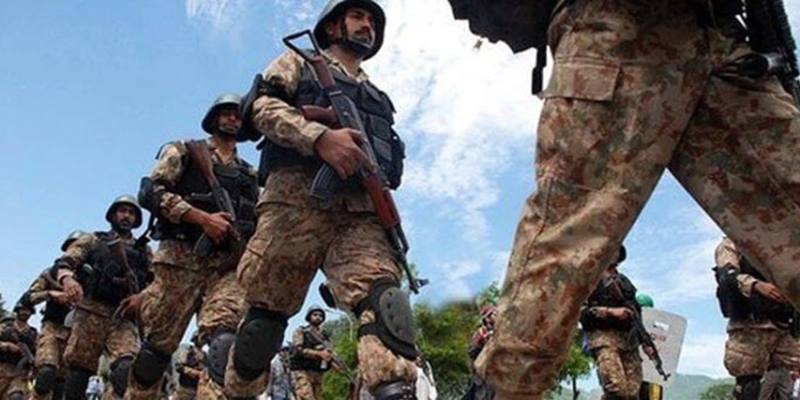This is a critical moment in our history perhaps unmatched for its severity and its brutal reality. The experiential nightmare that our country is passing through is perhaps unparalleled for the enemy is neither foreign nor fully identifiable. At the same time, never has there been a clear backing of a military campaign against domestic agents of subversion and anarchy. Forget the doctored samples of opinion polls, often conducted by foreign agencies. That by itself should make us ashamed for our proclivity to accept what others have to analyse and determine for us. Even ignore the fringe voices of dissent led by those who neither have credibility or sagacity to comprehend the existential crisis faced by Pakistan. The army has shown vision and displayed courage in tackling a menace that alas is a home-grown cancer due to our short-sighted strategies in pursuit of phantom depths. The battle to be won is now the country itself.
The political consensus of sorts that has accompanied the military action against the Taliban is also remarkable. Notwithstanding the spin doctors posing as analyst-anchors on the idiot box, the political class has recognised that its survival is embedded in the battle against extremism that predicates itself on elimination of sane, moderate and secular politics itself. This was the Swat model – blow the polity to bits and create a vacuum for a takeover. An age-old recipe employed by the hordes from Central Asia that invaded Muslim Delhi again and again during Sultanate and Mughal periods of our common histories which refuse to be partitioned.
Now, the brutal assassination of Mufti Naeemi in Lahore is nothing but a clear message of how a minority school of thought within Sharia-mongers wants to impose its version of politics, religion and culture on this diverse and vibrant country. The danger, after the relentless use of violence by the forces of darkness, is that the public opinion that swung against the Taliban after Swat brutalities and the political consensus that emerged around that, might be cracked. After all, military resolve has not taken place in isolation nor under foreign pressure only. The international pressure on Pakistan has remained unabated since 9/11 and has intensified with each passing year. But it was only when we faced the spectre of annihilation as a society and polity that we have decided to wage a war.
The military operation is just the beginning. It is going to be a war, if the consensus is further deepened and nurtured, for the next few years given the way it is spilling into big cities, engulfing sectarian and ethnic tensions germane to Pakistan’s society. It has to be fought not just militarily either. It has to be waged within the media, within the education system and above all with a credible ideological alternative to suicidal anti-Americanism and vague notions of tribal justice founded on misogyny.
The challenges are immense but not insurmountable. And, historic opportunities exist for reversal of three decades of adventurism we, as a state, followed by fanning the worst of hatreds, pernicious ideologies that the vast majority of the country does not relate to. Rural Pakistan is intrinsically secular. The working classes in the rural environs of Punjab and Sindh cannot afford to accept Islamism that excludes women from the livelihood arrangements. The Baloch have always been secular in their orientation despite problematic elements of their tribal codes. The Pakhtun culture is another story: its narratives are viewed through the eyes of colonial historians and commentators. The essential cultural metaphor of scepticism about the mullah in Pakhtun folklore and poetry has been grossly underreported and distorted. The fit between tribal codes and Taliban Islam is also a misnomer. This is why in a fair election, ordinary Pakistanis despite their deep love for their faith refuse to vote for self-styled Islamist agendas.
But the misleading currents of analyses that this is an American war, and somehow the Taliban have public support in pockets of Pakistan, are inherently dangerous propaganda tools deliberately cultivated to suit certain interests. The refugees in NWFP camps tell a different story: of harrowing harassment, violence, disruption and crime. There is neither a political ideology nor any moral basis in the operations of those who are touted as anti-imperial harbingers of justice and equality.
The government must now embark on five major missions. First, a massive public campaign – within and outside the confines of the media – to sustain the momentum of this war and its complexity ought to be launched. Second, effective and quick reconstruction of the war-affected areas should be achieved preferably outside the government ambit as the existing red-tapism will only bolster the myth of Taliban quick fix. Third, a government of national unity ought to be in charge of this war and the recent divisive party-politics needs to be packed and trashed if the political elites want to survive. Fourth, the madressah reform programme that could not be implemented by a military regime needs to be implemented with the involvement of Deobandi leaders and Barelvi schools that are now patently mobilised against the Taliban version of Islam. Finally, the abandoned police reforms of 2002 need to be pulled out of the cabinets of expediency and reviewed on an emergency basis. With the current abysmal levels of police operations, we will not be able to complement or win the military operations.
Pakistan has survived many rough patches. It is not an ordinary country that will dissipate nor will it be a walkover. Provided its state reinvents itself and traditional politics of opportunism is replaced by a people-oriented vision, and a programme of redistributive justice. A tall order indeed but is there any other option?
Courtesy : The News
The writer is a development professional and a writer based in Lahore. He blogs at www.razarumi.com and edits Pak Tea House and Lahorenama e-zines. Email: razarumi@gmail.com



